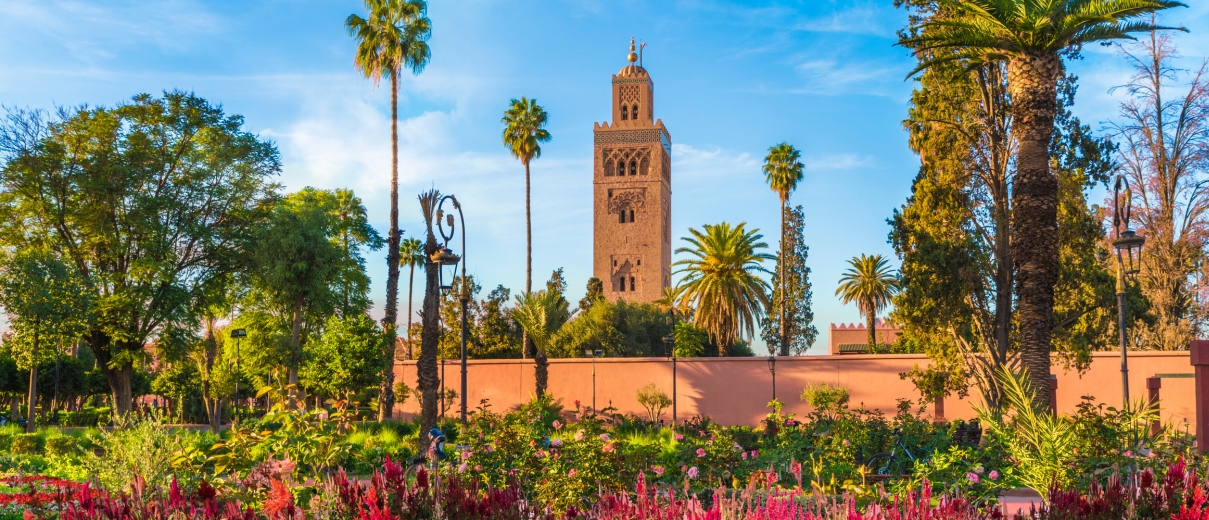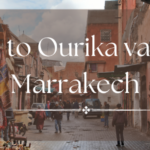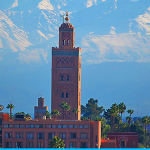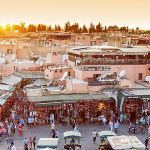The towering minaret you behold in Marrakech today bears the name derived from its proximity to the former bustling manuscript and book market.
The Koutoubia mosque, which is located in Marrakech, is well-known for its tall minarets. This amazing example of Islamic architecture has drawn the interest of both locals and tourists to Marrakech. However, what is the meaning behind its name? To understand the meaning of the term “Koutoubia or Kutubiyya,” we must embark on a historical, cultural, and linguistic voyage through time.
Table of Contents
The Origins of Koutoubia: A Linguistic Journey
Its name is derived from the Arabic word “Kutub/كتب” which means “books”. What is the relationship between the mosque and books or the book market? The answer lies in Marrakesh’s rich history as a vibrant center of trade and cultural exchange during the Middle Ages.
During the Marinid Caliphate in the twelfth century, Marrakech flourished as a bustling city teeming with traders, craftsmen, and scholars. Its strategic location on trade routes across the desert facilitated the exchange of goods, ideas, and knowledge across continents. In this context of intellectual activity and cultural diversity, the Koutoubia Mosque emerged as a beacon of light.
Word of Mouth: The reason they call it Koutoubia is because there was a book market nearby that was famous. They name it after that book market!
The Heritage of Koutoubia Mosque
The Koutoubia Mosque was built in the late 12th century by the Almohad Caliph Abd al-Mu’min (Not to be confused, Abd al-Mu’min completely rebuilt the mosque around 1158, with the help of Yaqub al-Mansur, who put the finishing touches on the minaret around 1195. The mosque you see now in Marrakech Medina is the second one that was rebuilt). At this time mosques became like schools. Not only did it serve as a center for scholarly discussion and learning, but it was also a sacred place of worship. Many traders offered a wide range of books, manuscripts, and antiquities in the nearby souk.
The name “Koutoubia” reflects the historical connection of the mosque to the book trade that characterized the surrounding area in medieval Marrakech. In the old city of Marrakech, there were gatherings of book vendors and writers near the mosque, where their stalls adorned with colorful manuscripts and illuminated texts attracted students of knowledge from various places.
Symbolism and Significance
Analyzing its linguistic origins reveals that the term “Koutoubia” has a more profound meaning as is revealed by historical documents. Similar to how books serve as stores of knowledge, wisdom, and cultural heritage, the Koutoubia Mosque represents the continuing legacy of education and study in Islamic society.
In addition, the Koutoubia Mosque’s juxtaposition of spirituality and commerce embodied how various human efforts are interrelated, ranging from the quest for spiritual enlightenment to the interchange of products and ideas in the marketplace. In this sense, the multifaceted character of Marrakesh as a center for intellectual research and cultural interaction is embodied in the name “Koutoubia”.
Preserving the Heritage
Today, the Koutoubia Mosque stands as a witness to the rich cultural heritage and architectural grandeur of Marrakech. Its towering minaret, adorned with intricate geometric patterns and elegant decorations, casts a captivating silhouette against the azure sky, drawing attention and evoking wonder.
As visitors stroll through the lively streets of Marrakech, the name “Koutoubia” serves as a poignant reminder of the city’s ancient past and its enduring spirit of innovation. Whether drawn to the mosque by spiritual devotion or thirst for knowledge, the heritage of the Koutoubia Mosque continues to inspire and attract all who encounter its timeless beauty.
In Conclusion
Tucked away in the colorful tapestry of Marrakech’s cultural legacy is the magnificent Koutoubia Mosque, a glowing gem that echoes with the passing of time. Its name, a patchwork of meanings, reveals a story of wisdom, spirituality, and entwined customs. Analyzing its language subtleties reveals important details about its history. As you stroll through the small streets of Marrakech, stop to admire the Koutoubia Mosque and consider the rich history that is embodied in its name and the deep stories that are carved into its walls.
Join countless satisfied travelers who have experienced Morocco with us. We customize every detail to make your Moroccan adventure uniquely yours. Explore the Magic of Morocco with us!





































































